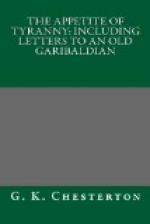the most English of all English traits; that shame
which the French may be right in calling “the
bad shame”; for it is certainly mixed up with
pride and suspicion, the upshot of which we call shyness.
Even an Englishman’s rudeness is often rooted
in his being embarrassed. But a German’s
rudeness is rooted in his never being embarrassed.
He eats and makes love noisily. He never feels
a speech or a song or a sermon or a large meal to
be what the English call “out of place”
in particular circumstances. When Germans are
patriotic and religious they have no reactions against
patriotism and religion as have the English and the
French. Nay, the mistake of Germany in the modern
disaster largely arose from the facts that she thought
England was simple when England is very subtle.
She thought that because our politics have become largely
financial that they had become wholly financial; that
because our aristocrats had become pretty cynical
that they had become entirely corrupt. They could
not seize the subtlety by which a rather used-up English
gentleman might sell a coronet when he would not sell
a fortress; might lower the public standards and yet
refuse to lower the flag. In short, the Germans
are quite sure that they understand us entirely, because
they do not understand us at all. Possibly if
they began to understand us they might hate us even
more: but I would rather be hated for some small
but real reason than pursued with love on account of
all kinds of qualities which I do not possess and
which I do not desire. And when the Germans get
their first genuine glimpse of what modern England
is like they will discover that England has a very
broken, belated and inadequate sense of having an
obligation to Europe, but no sort of sense whatever
of having any obligation to Teutonism.
This is the last and strongest of the Prussian qualities
we have here considered. There is in stupidity
of this sort a strange slippery strength: because
it can be not only outside rules but outside reason.
The man who really cannot see that he is contradicting
himself has a great advantage in controversy; though
the advantage breaks down when he tries to reduce
it to simple addition, to chess, or to the game called
war. It is the same about the stupidity of the
one-sided kinship. The drunkard who is quite
certain that a total stranger is his long-lost brother,
has a greater advantage until it comes to matters
of detail. “We must have chaos within”
said Nietzsche, “that we may give birth to a
dancing star.”
In these slight notes I have suggested the principal
strong points of the Prussian character. A failure
in honour which almost amounts to a failure in memory:
an egomania that is honestly blind to the fact that
the other party is an ego; and, above all, an actual
itch for tyranny and interference, the devil which
everywhere torments the idle and the proud. To
these must be added a certain mental shapelessness
which can expand or contract without reference to




